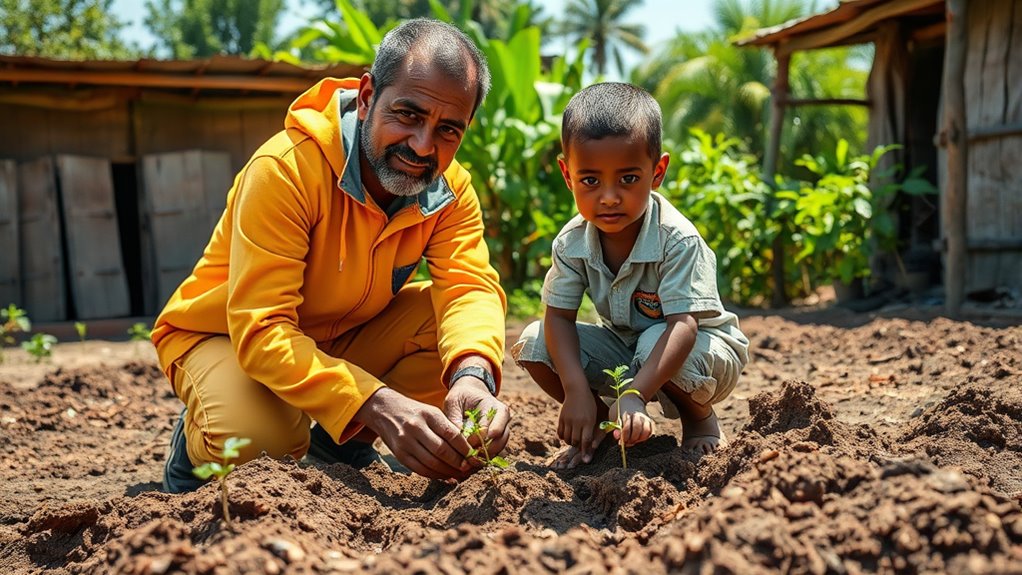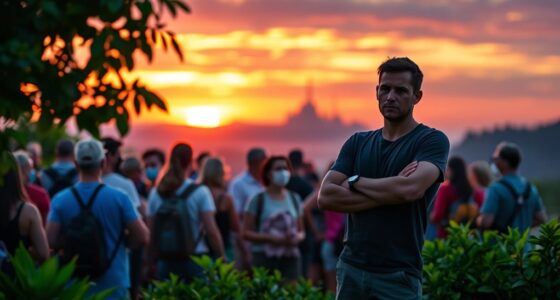To guarantee your volunteer holiday has genuine impact, research organizations for transparency, reviews, and clear project goals. Check that projects align with community needs, involve local leadership, and promote sustainable practices. Clarify your role, consider your skills, and ensure long-term support structures are in place. Be mindful of ethical standards and funding sources. Want practical tips to pick projects that truly make a difference? Keep exploring to learn more.
Key Takeaways
- Verify organization transparency through reviews, annual reports, and clear financial disclosures to ensure responsible fund management.
- Assess community involvement and local leadership to confirm projects foster genuine cultural immersion and sustainable impact.
- Ensure projects align with local needs via community consultation, needs assessment, and respecting cultural sensitivities.
- Confirm clear roles, expectations, and boundaries are established with project coordinators for effective participation.
- Prioritize projects incorporating environmental conservation and ongoing support structures for lasting benefits.
Understanding the Goals of Volunteer Projects
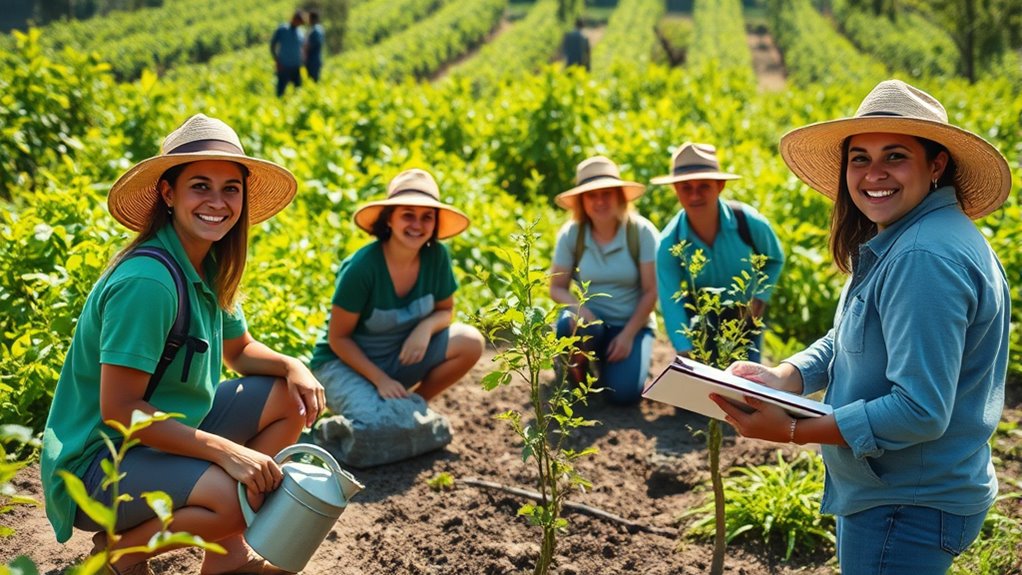
Understanding the goals of volunteer projects is essential to guarantee your efforts have a meaningful impact. When you choose a project, consider how it promotes cultural immersion, allowing you to connect deeply with local communities and traditions. Volunteer tourism isn’t just about helping; it’s about engaging with the culture authentically. Some projects focus on sustainable development, aiming to improve local infrastructure or education, while others center on environmental conservation. Knowing the project’s core objectives helps you align your skills and passions with its mission. It also assures your experience contributes positively and respects the community’s needs. By clarifying these goals, you can avoid superficial adventure tourism and instead create genuine, lasting change through your volunteer work. Incorporating an understanding of sustainable development strategies can enhance the effectiveness of your contributions and ensure long-term benefits for the community.
Researching the Organization’s Reputation and Transparency
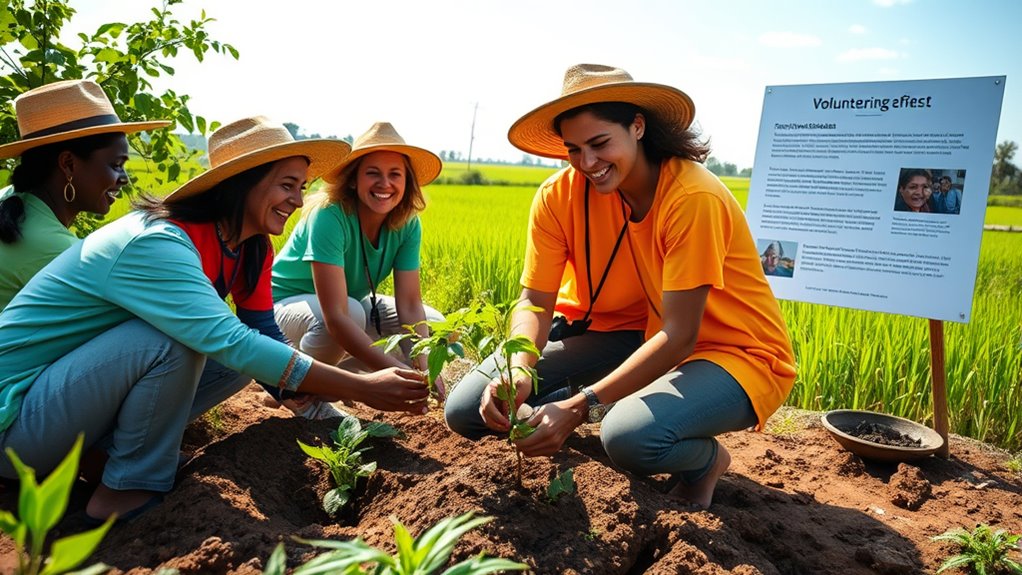
How can you guarantee that your volunteer efforts are truly impactful? Start by researching the organization’s reputation management. Look for reviews, testimonials, and third-party evaluations to gauge their credibility. Transparency reporting is equally important; reputable organizations openly share their goals, progress, and financials. Check if they publish annual reports or updates that detail how funds are used and project outcomes. Avoid groups with vague or inconsistent information, as these may lack accountability. A transparent organization demonstrates integrity and a genuine commitment to its mission. By thoroughly vetting their reputation and transparency, you ensure your volunteer efforts support a legitimate cause and contribute to meaningful change. This step helps you avoid wasting time and resources on projects that might not deliver real impact. Additionally, verifying their hours of operation can help determine how accessible their services are and whether they align with your availability.
Assessing the Community’s Needs and Involvement
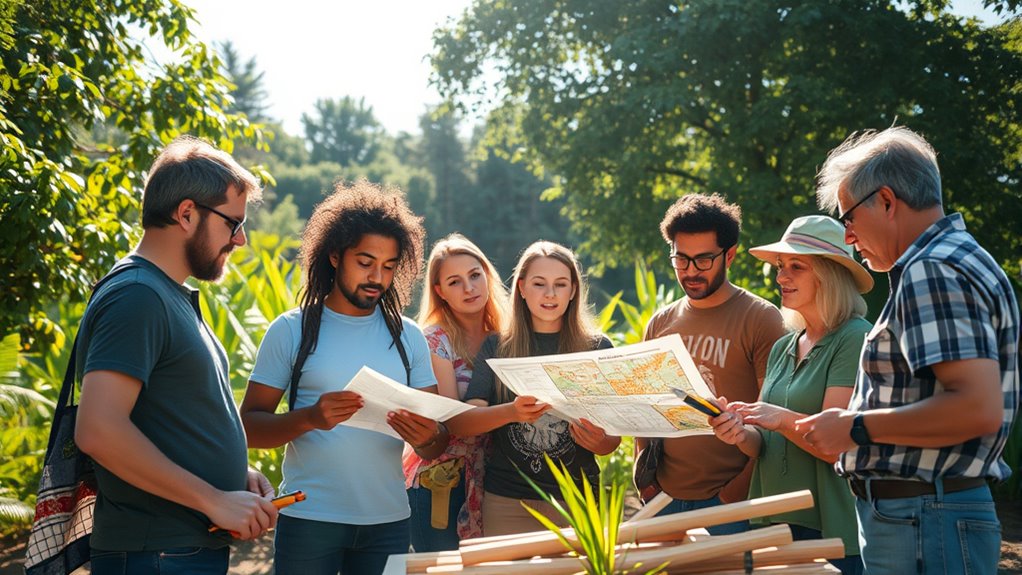
To make your volunteer efforts truly impactful, you need to understand the community’s needs through a thorough needs analysis. Recognizing how involved residents already are can help you identify where your support will make the biggest difference. By evaluating these factors, you guarantee your contribution aligns with what the community truly requires. Incorporating insights about existing community engagement can further refine your approach and ensure sustainable impact.
Community Needs Analysis
Have you ever wondered how volunteer programs guarantee their efforts truly meet community needs? The key is conducting a thorough community needs analysis. Start by engaging local stakeholders to understand priorities, respecting cultural sensitivity and avoiding assumptions. Next, assess existing resources and gaps to ensure your efforts complement ongoing initiatives. Finally, consider language barriers and adapt communication methods accordingly, ensuring the community’s voice is heard. This process involves three essential steps:
- Stakeholder Engagement: Build trust and gather accurate insights.
- Resource and Gap Assessment: Identify where support is most needed.
- Communication Strategy: Overcome language barriers to facilitate participation.
In addition, understanding community needs through methods like surveys and focus groups can provide valuable insights for effective planning.
Local Engagement Levels
Ever wondered why some volunteer efforts resonate deeply within a community while others fall flat? It all comes down to local engagement levels. When you assess a community’s needs, consider how involved residents are and whether projects foster genuine cultural immersion. High engagement indicates that locals support and trust the initiative, guaranteeing sustainability. In areas where adventure tourism is popular, volunteers can tap into existing interest, but it’s crucial to avoid superficial involvement. You should look for projects that encourage community participation rather than just visitor-driven activities. Truly impactful volunteer holidays prioritize understanding local dynamics, building relationships, and respecting cultural nuances. This approach helps ensure your efforts align with community priorities, creating lasting benefits rather than fleeting moments of goodwill. Recognizing the importance of community involvement can make a significant difference in the success of volunteer projects.
Evaluating the Project’s Sustainability and Long-Term Impact
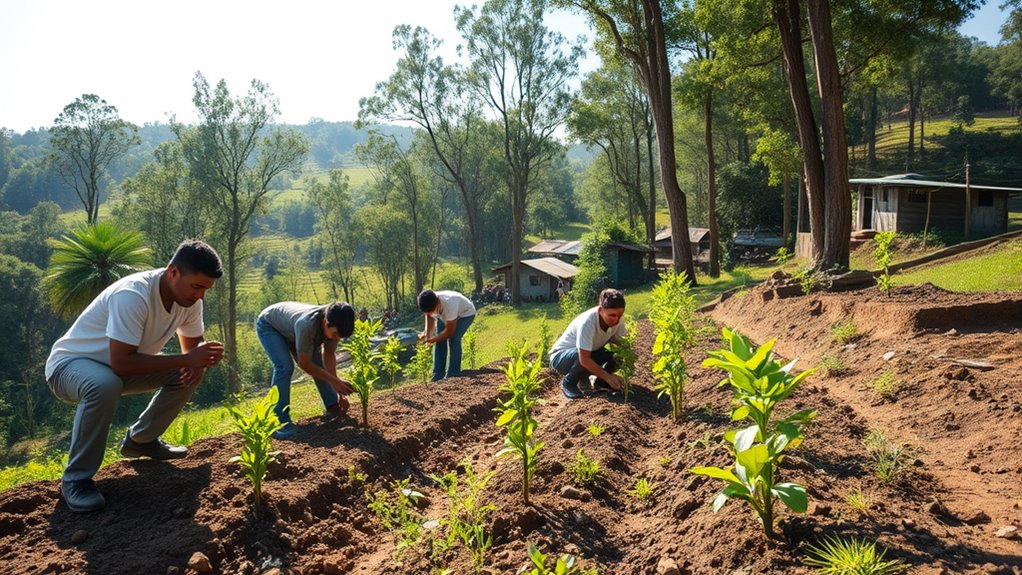
To guarantee your project lasts, you need to focus on community ownership and ongoing engagement. Ask yourself if locals are actively involved and committed beyond your volunteer presence. Strong support structures are essential to maintain progress long after your team leaves. Ensuring the community understands the importance of sustainable practices can significantly enhance the project’s long-term success.
Community Ownership and Engagement
Evaluating community ownership and engagement is essential for understanding a volunteer holiday project’s sustainability and long-term impact. You should look for ways the project integrates local traditions, ensuring the community feels connected and invested. Strong community ownership often manifests through:
- Active participation in planning and decision-making, reflecting genuine engagement.
- Incorporation of local traditions into project activities, respecting cultural practices.
- Effective project branding that highlights community-led efforts and promotes local identity.
A project that encourages community leadership demonstrates a commitment to long-term benefits. When locals take ownership, they’re more likely to maintain initiatives after volunteers leave. Engagement rooted in local traditions and authentic project branding fosters trust, empowerment, and sustainable change, making a real difference that endures.
Ongoing Support Structures
How can a volunteer holiday project guarantee its benefits endure beyond the volunteers’ involvement? The key lies in establishing ongoing support structures that promote sustainability. Projects should prioritize cultural sensitivity, guaranteeing local communities lead initiatives and that efforts respect traditions. This fosters long-term ownership and reduces dependency. Additionally, evaluating environmental impact helps prevent harm to ecosystems, ensuring projects support ecological health. Effective ongoing support might include training local leaders, creating resource hubs, or forming partnerships with local organizations. These strategies enable communities to maintain progress independently. Embedding culturally sensitive practices and focusing on environmental sustainability, along with data-driven strategies, helps you guarantee that the benefits of your volunteer work persist well after your departure, creating lasting positive change.
Ensuring Ethical Volunteer Practices
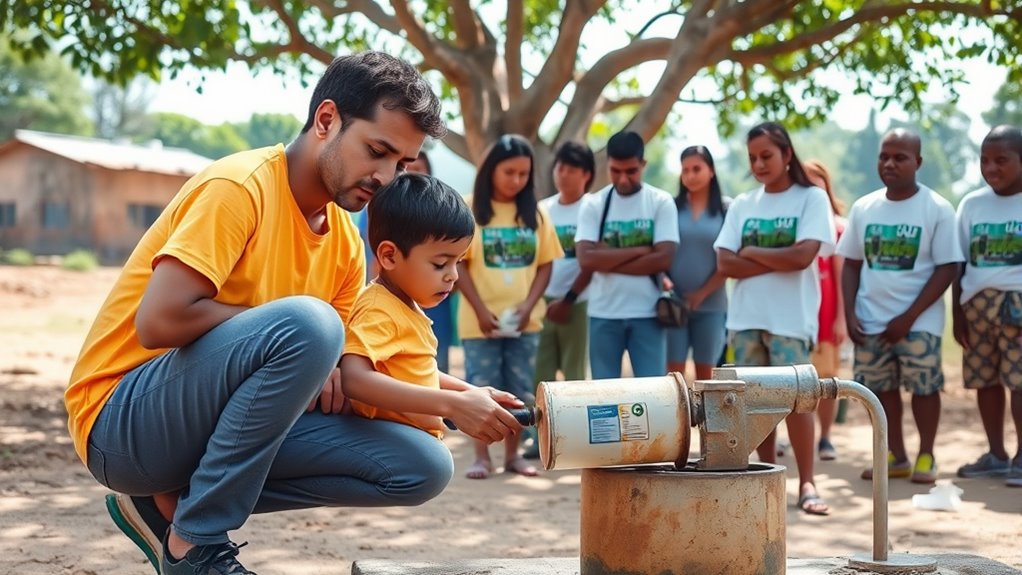
Ensuring ethical volunteer practices is essential for creating a positive and sustainable impact. When engaging in eco tourism or cultural immersion projects, your focus should be on respecting local communities and environments. To do this, consider these key steps:
- Research the organization thoroughly to confirm it promotes community-led initiatives and environmental sustainability.
- Avoid projects that prioritize short-term gains over long-term benefits, ensuring lasting positive change.
- Respect local customs and traditions, supporting initiatives that empower communities rather than exploit them.
- Support projects that incorporate environmental innovations, which help ensure the longevity and effectiveness of your volunteer efforts.
Clarifying Your Role and Responsibilities
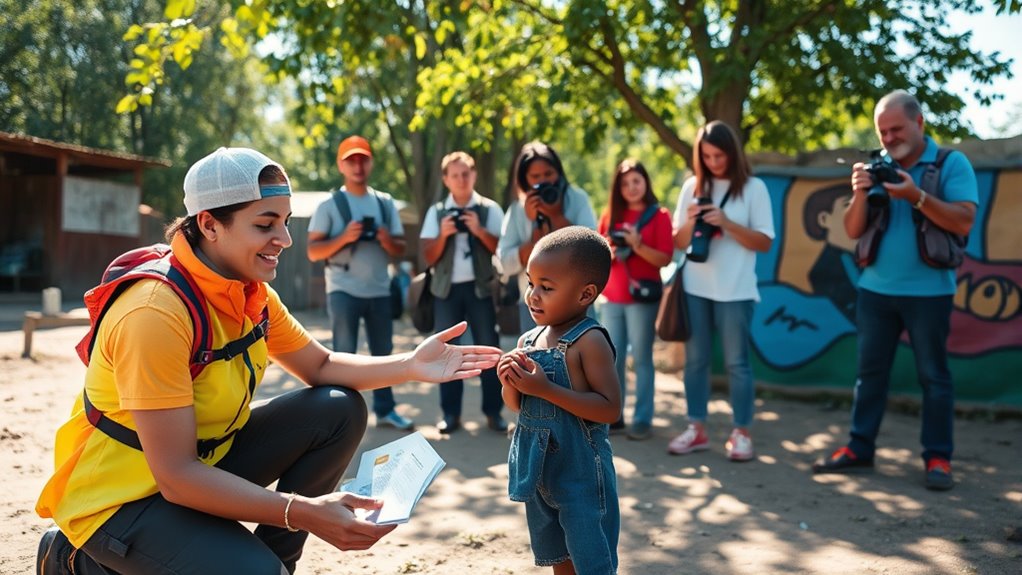
To make your volunteer experience successful, you need to be clear about your tasks and what the project expects from you. Don’t be afraid to ask questions and set boundaries to guarantee your role aligns with your skills and limits. Open communication helps avoid misunderstandings and keeps everyone on the same page. Understanding forsale 100 items related to project resources can also help you better prepare for your responsibilities.
Define Your Tasks Clearly
Have you ever felt unsure about what exactly is expected of you during a volunteer holiday? Clarifying your tasks helps you stay focused and makes the experience meaningful. To do this effectively, consider these steps:
- Clearly define your role, including specific duties related to cultural immersion and community needs.
- Confirm your responsibilities with project coordinators, ensuring you understand travel logistics and local customs.
- Set realistic goals for what you can accomplish, balancing your skills with the project’s priorities.
- Understanding the significance of prophetic dreams can also help you reflect on your motivations and personal growth during your volunteer experience.
Understand Project Expectations
How well do you understand what’s expected of you during your volunteer holiday? Clarifying project expectations is essential to ensure your efforts make a real impact. It’s important to know your specific role and responsibilities upfront. This clarity helps you contribute effectively while embracing the cultural exchange experience. Be aware that language barriers might cause misunderstandings, so ask questions if anything isn’t clear. Understanding what’s expected also prevents frustration and helps you adapt quickly to new environments. Check with project coordinators about your tasks, work hours, and the community’s needs. The more you understand your role, the better you can focus your energy on meaningful work and foster positive relationships with local partners. Clear expectations set the stage for a rewarding volunteer experience.
Communicate Boundaries Effectively
Once you’ve clarified what’s expected of you, it’s equally important to communicate your boundaries clearly. Boundaries setting helps prevent misunderstandings and guarantees respectful communication. To do this effectively:
- Be specific about your limits regarding workload, working hours, and personal space.
- Use respectful language to express your boundaries without sounding confrontational.
- Reinforce your role by politely declining tasks outside your scope or expertise.
Considering the Skills and Qualifications Required
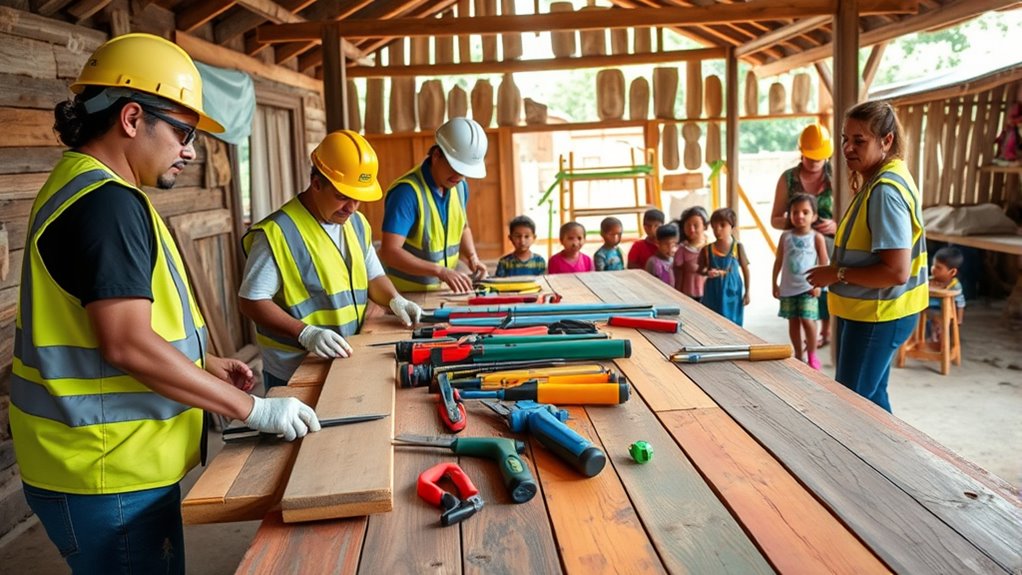
What skills and qualifications do you need to commence on a volunteer holiday? Your first step is evaluating how your existing skills match the project’s needs through skill matching. Many projects require specific qualification requirements, such as certifications or prior experience, especially in specialized fields like healthcare, teaching, or construction. It’s vital to review these qualification requirements carefully to ensure you’re eligible and prepared. If your skills don’t fully align, consider whether you’re willing to learn or if you should seek a project better suited to your background. Being honest about your abilities helps both you and the organization make the most meaningful contribution. Remember, selecting a project that matches your skills leads to a more impactful and rewarding volunteer experience.
Reviewing Funding and Allocation of Resources
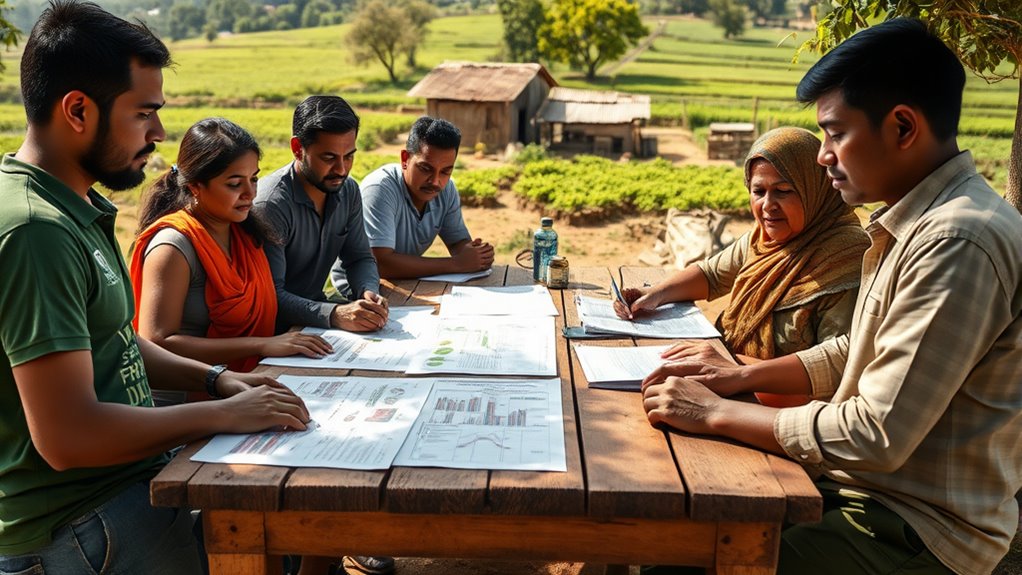
Understanding how a project’s funding is distributed guarantees your efforts align with available resources. Funding transparency is key to verifying that funds are allocated appropriately. When reviewing resource allocation, consider these factors:
Ensuring transparent funding distribution aligns resources effectively with project priorities.
- Budget Breakdown: Ensure funds are directed toward project priorities rather than administrative costs.
- Funding Sources: Identify if diverse and sustainable sources support the project’s longevity.
- Transparency Measures: Confirm the organization openly reports on funding and resource use, reducing risks of misallocation.
Analyzing Feedback From Past Participants
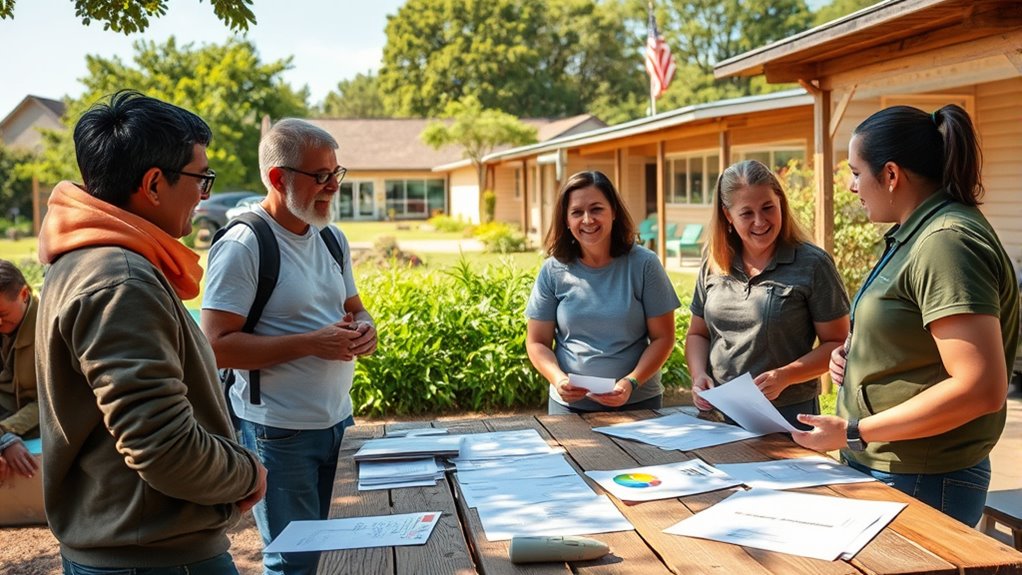
Reviewing feedback from past participants provides valuable insights into how well a volunteer holiday program meets its goals and addresses participant needs. When you analyze these responses, look for comments on cultural immersion experiences—how deeply you engaged with local traditions and communities. Feedback often highlights whether adventurous activities added meaningful excitement or felt superficial. You’ll discover if activities promoted genuine understanding or simply served as entertainment. Pay attention to recurring themes, both positive and negative, to gauge the program’s authenticity and impact. This process helps you identify programs that foster real cultural exchange and purposeful adventure. Ultimately, analyzing feedback ensures you choose a project that aligns with your desire for meaningful involvement and memorable experiences, rather than just ticking off adventure boxes.
Aligning Personal Expectations With Project Outcomes
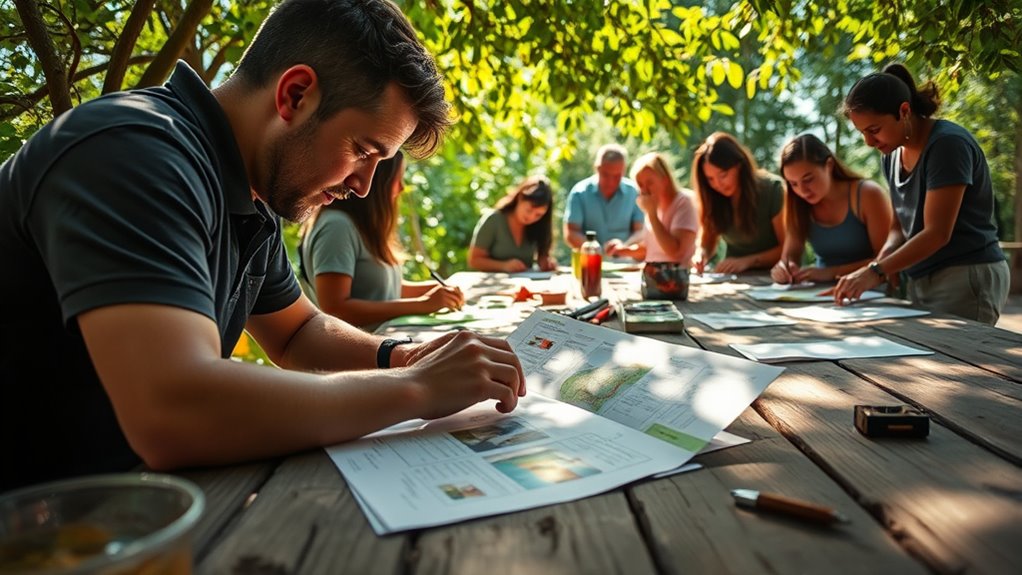
To guarantee a volunteer holiday is truly rewarding, you need to align your personal expectations with the actual project outcomes. This requires understanding that cultural sensitivity plays a crucial role in respecting local customs and ensuring your efforts are appropriate. Additionally, focus on personal growth by setting realistic goals for skill development and community impact. To do this effectively:
- Research the project’s goals and community needs beforehand.
- Recognize that your contribution might be part of a larger, ongoing effort.
- Maintain flexibility and an open mind, appreciating cultural differences and local perspectives.
Frequently Asked Questions
How Do I Handle Language Barriers During Volunteering?
When facing language barriers during volunteering, you can embrace language immersion by learning basic phrases and local customs beforehand. Use visual aids and gestures to communicate effectively. Seek out projects with multilingual support or bilingual staff to bridge gaps. These strategies help you connect better, build trust, and make a meaningful impact. Remember, patience and a willingness to learn go a long way in overcoming language challenges.
What Safety Measures Are in Place for Volunteers?
You should familiarize yourself with the safety protocols and emergency procedures before starting your volunteer work. These measures are designed to safeguard you and ensure quick responses in case of accidents or emergencies. Always follow the guidelines provided, communicate any concerns to the coordinators, and stay alert to your surroundings. Knowing the safety protocols helps you feel confident and prepared, making your volunteering experience safer and more effective.
How Flexible Are Project Schedules and Commitments?
Oh, the thrill of unpredictable schedules! You’ll find most projects offer some flexibility, but don’t expect to drop everything last minute. The project schedule flexibility varies, and commitment duration is usually clearly outlined so you know what you’re signing up for. While some programs let you adapt your involvement, others require steady dedication. So, check the details upfront, because flexibility isn’t limitless, even in volunteer adventures!
Can I Volunteer for Short-Term or One-Time Projects?
You can definitely participate in short-term volunteering or one-time projects. Many organizations offer opportunities designed for those with limited time, allowing you to make a meaningful impact quickly. These projects usually last from a day to a few weeks, fitting into your schedule easily. By choosing short-term volunteering, you get the flexibility to contribute without long-term commitments, making it perfect if you want to help but have limited availability.
What Support Is Available if Volunteer Experiences Are Challenging?
Ever felt like you’re steering uncharted waters? When volunteer experiences become challenging, you’re not alone. Support is available to help you through emotional struggles and cultural adaptation. Many organizations offer counseling, peer support, and orientation sessions to ease your passage. Remember, seeking help isn’t a sign of weakness—it’s a step toward making your impact meaningful and sustainable. You’re supported every step of the way, turning challenges into growth opportunities.
Conclusion
When choosing a volunteer holiday, remember that over 70% of projects with clear, ethical practices see lasting community benefits. By thoroughly vetting organizations and aligning your skills with project needs, you guarantee your effort truly makes an impact. Prioritize transparency, sustainability, and community involvement to maximize your contribution. Ultimately, a well-vetted project not only benefits others but also enriches your experience, making your volunteer holiday genuinely rewarding.

